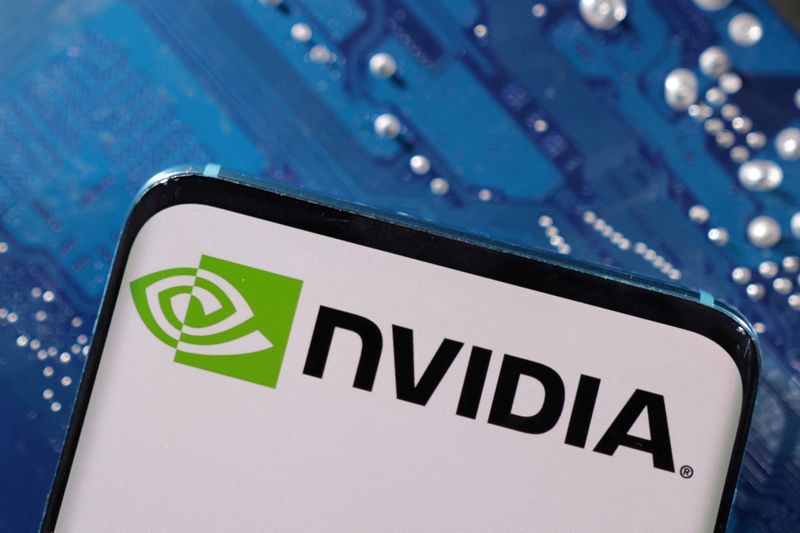By Deborah Mary Sophia, Noel Randewich and Saqib Iqbal Ahmed
(Reuters) -Nvidia shares dropped more than 6% on Thursday after its forecast fell short of lofty expectations, though some believe the modest sell-off showed investors still remain confident in the generative AI boom that has powered the chip giant's stock higher all year.
The company on Wednesday forecast third-quarter gross margins that could miss market estimates and revenue that was largely in line. But some investor concerns were allayed after the company said it expects production of its next-generation Blackwell chips to ramp up in the fourth quarter.
Shares of other chip companies were mixed after some reversed gains from earlier in the session. Broadcom (NASDAQ:AVGO) shares ended 0.8% lower while those of Advanced Micro Devices (NASDAQ:AMD) fell 0.6%. Shares of Arm rose 5.3%.
Nvidia’s shares remain up 137% this year, making the company a pillar of the rally in U.S. stocks. Those gains have been driven in part by a series of blowout quarterly revenue forecasts, leading investors to build up ever greater expectations for its growth.
"They beat but this was just one of those situations where expectations were so high. I don't know that they could have had a good enough number for people to be happy," said JJ Kinahan, CEO of IG North America and president of online broker Tastytrade.
The forecast followed strong second-quarter earnings that topped Wall Street expectations, and the AI bellwether announced a new $50 billion share buyback as well.
"Investors want more, more and more when it comes to Nvidia," said Dan Coatsworth, investment analyst at AJ Bell.
"It looks like investors might not have taken the average of analyst forecasts to be the benchmark for Nvidia's performance, instead they've taken the highest end of the estimate range to be the hurdle to clear."
Nvidia forecast revenue of $32.5 billion, plus or minus 2%, for its fiscal third quarter, compared with analysts' estimates of $31.8 billion, according to LSEG data. That revenue forecast implies 80% growth from the year-ago quarter, but was below the top-end of market estimates at $37.90 billion.
BUYING OPPORTUNITY?
Some analysts saw the dip as a buying opportunity.
"Nvidia has had much bigger drawdowns on (earnings) reports ... we think the sell-off is an opportunity to accumulate the stock," said Nancy Tengler, CEO of Laffer Tengler Investments.
Some Big Tech stocks shrugged off the weakness, suggesting that investors may not see the report as a bad sign for the AI boom. Shares of Amazon.com (NASDAQ:AMZN) and Apple (NASDAQ:AAPL) closed higher on Thursday while Alphabet (NASDAQ:GOOGL) dipped 0.7%.
"The long-term AI story is still sort of intact. It's just a bit of a relief that the numbers weren't disastrous," said Ben Barringer, analyst at Quilter Cheviot.
Worries about slow payoffs from hefty AI investments have dogged large technology companies in recent weeks, with shares of Microsoft (NASDAQ:MSFT) and Alphabet trading lower since their quarterly reports last month.
A delay in the production ramp-up of Nvidia's next-generation Blackwell chips until the fourth quarter was not a big concern, analysts said, with the company seeing strong demand for its current-generation Hopper chips.
However, some analysts were worried about rising regulatory scrutiny after Nvidia disclosed requests for information from U.S. and South Korean regulators, adding to inquiries from the EU, UK and China previously.
"After the DOJ win over Google, large-cap tech has got to be more cognizant of regulatory intervention ... historically, the threat was a little bit toothless," Barringer said. "But now that they've got this win over Google, investors have to pay a bit more attention."

The lackluster response to Nvidia's earnings report could help set the tone for market sentiment heading in to what is historically a volatile time of the year. The S&P 500 has fallen in September by an average of 0.8% since World War Two, the worst performance of any month, according to CFRA data.
Nvidia was valued at 36 times earnings ahead of its quarterly report, inexpensive compared with its average of 41 over the past five years. The S&P 500 is trading at 21 times expected earnings, compared with a five-year average of 18.